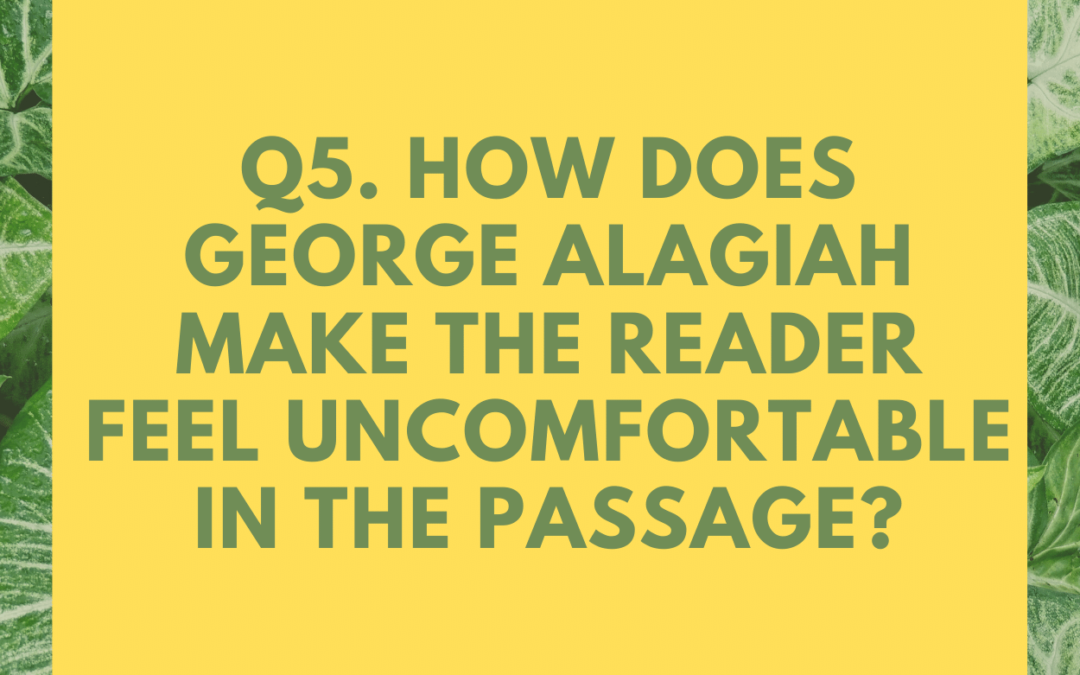Edexcel English IGCSE: A Passage to Africa by George Alagiah
Q5. How does George Alagiah make the reader feel uncomfortable in the passage?
In your answer, consider:
- the situation in Somalia;
- the journalism industry;
- the use of contrasts;
- any language techniques.
You should refer closely to the passage to support your answer. You may use brief quotations.
Edexcel English IGCSE Model Essay by an Expert
‘A Passage to Africa’ is uncomfortable to read. The journalism industry is presented as conflicted and complex, and the reader’s own position in relation to the suffering people of Somalia is similarly uncomfortable.
Alagiah makes the reader uncomfortable with graphic descriptions of the suffering he witnesses in Somalia. In the description of the injured old woman, for example, adjectives create a vivid and disturbing image for the reader: “decaying flesh”, “festering wound”, “shattered leg”, “putrid air” and “struggling breath”. In order to portray an impression of the horrendous feeding centres, Alagiah appeals to the reader’s senses: “hear and smell the excretion of fluids” and “held the clammy palm”. In response to these descriptions, the reader also experiences the “revulsion” described by Alagiah. This in itself is an uncomfortable reaction to suffering, as it seems disrespectful to consider their suffering distasteful or disgusting.
Alagiah’s portrayal of the journalism industry is also troubling. He describes the journalists’ search for an appropriately shocking image as “ghoulish”, acknowledging that it is morbid to have to search for the most terrible suffering they can find. He uses the simile of “craving for a drug” to describe the need for such an image, which suggests that this need is like an addiction, and beyond the journalists’ control. Indeed, he traces this “craving” back to the people who look at the images: “people in the comfort of their sitting rooms back home”. This is particularly uncomfortable for the reader, who is likely to be one of these people; the reader provides the demand for shocking images from war zones, and the journalists have to go “on the hunt” for these images.
The reader is drawn into Alagiah’s discomfort when he sees the man smiling in embarrassment at being seen in such terrible conditions. Alagiah is unsettled because the man’s apologetic expression highlights the injustice of the differences between their circumstances. If the man is embarrassed about being so weak, surely Alagiah should feel even more embarrassed for being so strong in comparison. To highlight the contrasts between them, he employs opposites in the description: the man is “weakened” and “ground down”, while Alagiah is “strong and confident”, for example. The reader, as a presumably relatively healthy and wealthy individual, is included in this disparity. The resulting discomfort is heightened by a reminder that the man, and all the other suffering people described in the passage, is just like the reader. This is highlighted by the use of the second person pronoun in the description of the man’s smile: “the kind of smile you might give”.
By highlighting and challenging the emotional distance between suffering individuals and those who read or watch programmes about it in the privileged world, Alagiah makes this passage an uncomfortable read for the people “back home”.



